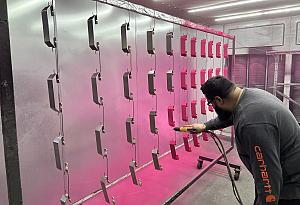Integrated Compliance Solutions Manager for Business Development
- FMA
- The Fabricator
- FABTECH
- Canadian Metalworking
Categories
- Additive Manufacturing
- Aluminum Welding
- Arc Welding
- Assembly and Joining
- Automation and Robotics
- Bending and Forming
- Consumables
- Cutting and Weld Prep
- Electric Vehicles
- En Español
- Finishing
- Hydroforming
- Laser Cutting
- Laser Welding
- Machining
- Manufacturing Software
- Materials Handling
- Metals/Materials
- Oxyfuel Cutting
- Plasma Cutting
- Power Tools
- Punching and Other Holemaking
- Roll Forming
- Safety
- Sawing
- Shearing
- Shop Management
- Testing and Measuring
- Tube and Pipe Fabrication
- Tube and Pipe Production
- Waterjet Cutting
Industry Directory
Webcasts
Podcasts
FAB 40
Advertise
Subscribe
Account Login
Search
Achieving cost-effective environmental compliance
How outsourcing waste management can help
- By Rich Wojnarowski
- February 14, 2002
- Article
- Shop Management
 |
Note: While this article discusses federal environmental statutes, many states have implemented programs that are at least as stringent as the applicable federal program. While federal regulations are in effect throughout the U.S., state or local governments may impose additional requirements where no federal regulations exist.
Local, state, and federal government environmental regulations have compelled manufacturers to make green changes to their plant operations. These regulations include the Resource Conservation and Recovery Act (RCRA), which empowers the government to hold plants responsible for hazardous waste from cradle to grave, meaning waste produced in 2002 can come back to haunt a company 10 years later in the form of fines and penalties.
Added to this are guidelines from the local publicly owned treatment works for discharging water, Department of Transportation manifesting, Occupational Safety and Health Administration requirements, and countless hours each month to complete a cycle of paperwork.
Complying with all these regulations has never been more complicated, and regulatory compliance affects the bottom line. Although some plant managers believe the first corner to cut during difficult financial times is compliance spending, the cost of noncompliance will render these short-term fiscal-year savings meaningless over time.
Some large companies hire environmental managers to oversee regulatory compliance, while owners of small companies often try to manage these duties themselves. In either case, companies also may choose to outsource the three main regulatory compliance components—waste transportation, treatment, and disposal—to an environmental services company. Outsourcing these duties does not mean a company relinquishes control of its waste; rather, it allows a manager to oversee the process while waste disposal experts do their jobs.
Generator Status
One of the most important duties an environmental services company provides is to determine a facility's generator status. Generator status specifies how each company must dispose of waste and includes three groups: large-quantity generators (LQG), small-quantity generators (SQG), and conditionally exempt small-quantity generators (CESQG).
LQGs and SQGs must meet many similar requirements, while CESQGs receive a pass for some regulations. The RCRA Subtitle C states that SQGs may accumulate up to 6,000 kilograms of hazardous waste on-site at one time for up to 180 days without being regulated as a treatment, storage, and disposal (TSD) facility, which requires an additional permit. However, if the waste must be transported more than 200 miles for disposal, it can be stored for 270 days, while LQGs have only a 90-day window to ship wastes without needing a TSD permit.
If a plant categorizes itself incorrectly, it may incur extra costs by following more stringent guidelines than are necessary. Conversely, if a company generates more waste than its generator status allows, it faces potential fines for noncompliance.
Waste Identification and Minimization
The next step in waste management is determining which wastes require special disposal. An environmental services company can track materials from the plant entry point through processing to exit from the plant. This helps plants determine how to handle waste efficiently.Knowing which processes produce metalworking wastes helps plants calculate future waste generation, and by gauging input materials versus waste in relation to volume, they can analyze each procedure to determine waste output and characteristics. This allows companies to determine which components of the total waste volume are hazardous.
Knowing the nature of individual waste components is significant because some plants combine all byproducts into one large waste rolloff that contains sludge and other solid materials, which is then transported, treated, and disposed of as hazardous material. However, many wastes generated at metal fabricating plants are not hazardous and do not require special treatment. An environmental services provider can identify and help implement waste separation techniques.
An environmental services provider also can suggest ways to minimize waste, including reducing the use of hazardous materials, energy, water, or other resources and protecting natural resources through conservation or use that is more efficient.
Minimizing hazardous waste production decreases the cost of disposal, but the reduction might alter a plant's generator status, which changes the restrictions imposed on it.
Employee Safety Training
Facilities that have hazardous materials on-site, including solvents, oils, coolants, cleaners, paints, and sludge, must develop and implement a hazard communication program. Employees working with these materials must be properly trained to comprehend Material Safety Data Sheets and product hazard labels and be able to identify hazardous materials and understand OSHA's Hazard Communication Standard.
Many environmental services companies provide training programs and materials to help plants determine and improve their employee safety status. In addition, software programs are available to help organize regulatory compliance information. These programs create one integrated file that contains templates for regulatory documents needed to comply with OSHA and Environmental Protection Agency guidelines.
Environmental planning software helps managers identify key safety and equipment procedures needed for each employment position at a plant, using a library of safety protection procedures to conduct a required Personal Protective Equipment Hazard Analysis and a general Job Hazard Analysis.
Green Products
A recent trend in some metal fabrication plants is using coolant management systems to reduce the amount of waste they produce each month. These continuous sump-side systems filter fluids and remove suspended particulates and tramp oils from the liquid, returning clean solvents to the fabricating process.Some plants also are using nontoxic coolants that do not require hazardous waste disposal. However, some companies still combine spent coolants with cleaners, paints, solvents, and plating chemicals, which causes the coolant to be deemed hazardous, resulting in excessive disposal costs.
Recently a new type of parts cleaner has been developed that can recycle up to 5 gallons of solvent three times a day, recovering nearly 100 percent of the used cleaning fluid. Typically, the recycling process flushes dirty solvent into a distillation chamber, and clean solvent transfers into the wash basin for immediate use. The dirty solvent then is heated in a vacuum to vapor point, and oily residue is separated for periodic removal. Solvent vapors are cooled to liquid state in the condenser, resulting in clean solvent, which is returned to the reservoir for immediate use.
Rich Wojnarowski is the integrated compliance solutions manager for business development at Safety-Kleen Corporation, 1301 Gervais St., Suite 300, Columbia, SC 29201, phone 800-342-8764, fax 803-231-7984, e-mail info@safety-kleen.com, Web site www.safety-kleen.com. Safety-Kleen Corp. provides total environmental waste management services with a service network of more than 250 collection and processing facilities.
About the Author
Rich Wojnarowski
1301 Gervais St., Suite 300
Columbia, SC 29201
800-342-8764
subscribe now

The Fabricator is North America's leading magazine for the metal forming and fabricating industry. The magazine delivers the news, technical articles, and case histories that enable fabricators to do their jobs more efficiently. The Fabricator has served the industry since 1970.
start your free subscription- Stay connected from anywhere

Easily access valuable industry resources now with full access to the digital edition of The Fabricator.

Easily access valuable industry resources now with full access to the digital edition of The Welder.

Easily access valuable industry resources now with full access to the digital edition of The Tube and Pipe Journal.
- Podcasting
- Podcast:
- The Fabricator Podcast
- Published:
- 04/16/2024
- Running Time:
- 63:29
In this episode of The Fabricator Podcast, Caleb Chamberlain, co-founder and CEO of OSH Cut, discusses his company’s...
- Industry Events
16th Annual Safety Conference
- April 30 - May 1, 2024
- Elgin,
Pipe and Tube Conference
- May 21 - 22, 2024
- Omaha, NE
World-Class Roll Forming Workshop
- June 5 - 6, 2024
- Louisville, KY
Advanced Laser Application Workshop
- June 25 - 27, 2024
- Novi, MI































